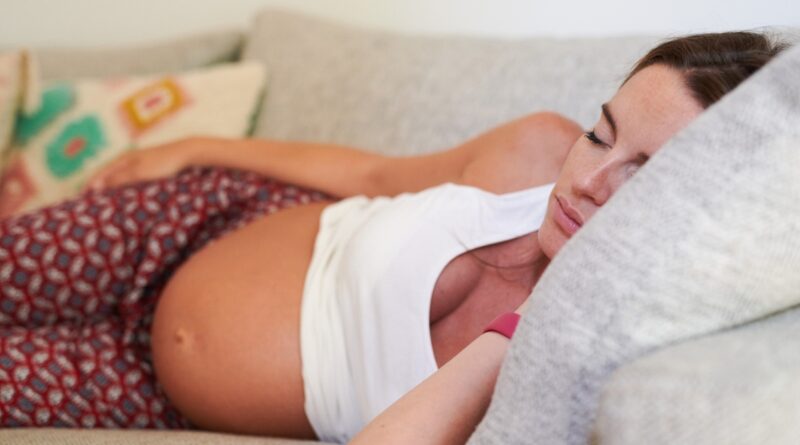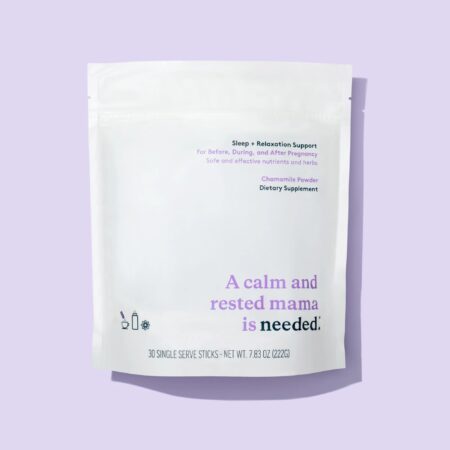Looking for pregnancy-safe sleep aids? A naturopathic doctor shares her picks
Adequate sleep is one of the most important aspects of a person’s health, yet for many women, sleep during pregnancy can be anything but dreamy.
It’s very common for pregnant women to experience sleep disturbances, with one study showing up to 76% experiencing poor sleep quality1. This is an unfortunate reality that can be very frustrating and exhausting, to say the least. From frequent night wakings to anxiety and insomnia, to restless leg syndrome and disturbances from heartburn, the list of what leads to sleep issues in pregnancy is quite long.
On top of sleep challenges during pregnancy, this is also a time when many conventional sleep aids are no longer safe to take. It can be confusing to navigate the various recommendations online and know who to trust and what is safe and effective. What’s a mama-to-be supposed to do?

As a hormone, fertility and women’s health naturopathic doctor, the founder of Womanhood Wellness , co-host of the podcast Healthy As A Mother, and a mother myself, I’m sharing some pregnancy-safe sleep aids and practices to help you get the rest you need—and may be desperately desiring.
, co-host of the podcast Healthy As A Mother, and a mother myself, I’m sharing some pregnancy-safe sleep aids and practices to help you get the rest you need—and may be desperately desiring.
Related: 12 best pregnancy pillows to help you find maximum comfort
The issue: Trouble falling asleep
The fix: Stop screen time 30 to 60 minutes before bedtime
Low melatonin is a common cause for issues with falling asleep.
Along with cortisol, melatonin is one of the main players in our circadian rhythm, the daily hormonal rhythm that rules our sleep and wake cycle. We naturally produce melatonin before bed and during the night in response to darkness. Regarding pregnancy, some animal and early human studies show melatonin may play a role in developing the fetal circadian rhythm and other key developmental stages, and may potentially reduce the risk of preeclampsia.2
Device screens emit a type of blue light that blocks melatonin. Staying up late watching shows or scrolling at night not only increases our stress hormone cortisol which can reduce melatonin, the light emitted from those screens can reduce this essential sleep hormone.3
Since we don’t have strong safety evidence on taking melatonin as a supplement in pregnancy, the best thing we can do is support our natural production of it.
Tips to boost melatonin production in pregnancy
- Remove TVs from your bedroom
- Avoid bringing your phone into the bedroom, or at least plug it in away from the bed
- Avoid watching or looking at screens 30-60 minutes before bedtime
- Consider sleeping with an eye mask or blackout curtains
Related: 6 highly effective sleeping masks that wrap you in a cocoon of darkness
blogherads.adq.push(function(){
blogherads.defineSlot(‘flexrec’, ‘ad_div_in_body_2’).setTargeting(‘targetingKey’,
‘targetingValue’).display();
});
The issue: Waking up in the middle of the night
The fix: Keep your blood sugar balanced
A drop in blood sugar is a common cause for waking up in the middle of the night.
Your blood sugar is the amount of glucose you have in your bloodstream at any given time. Glucose comes from the foods you eat and the stores you have in your body from past meals. Your brain, and many other organs, require a steady amount of this blood sugar to function properly. If your brain suspects a dip in blood sugar, it will try to alert you to remedy the situation. A drop in blood sugar is often what leads to symptoms such as fatigue, shakiness, nausea, cravings, irritability, feeling hangry… and sleep issues.
If your blood sugar dips at night, your brain will wake you up, attempting to get you to refuel. This can happen even if you don’t feel hungry, and it is a classic contributor to the 2 am to 4 am wake up.
Tips to keep blood sugar balanced in pregnancy
- Eat adequate protein at every meal
- Eat consistently, avoid going longer than 4 waking hours without eating
- Reduce high sugar foods
- Consider a higher protein and healthy fat snack an hour before bedtime to keep your blood sugar stable through the night (as long as this doesn’t aggravate heartburn)
- Ideas:
- A few apple slices with nut butter
- Some leftover baked chicken
- A few bites of leftover dinner
- A boiled egg
- Nuts and seeds
- Ideas:
The issue: Restlessness, tossing and turning, leg cramping
The fix: Consider supplementing with magnesium
Low magnesium is a common contributor to sleep issues paired with stress, anxiety or restlessness in the mind or muscles, including leg cramps.
Magnesium is a very important mineral that is needed at every life stage, but it is especially important in pregnancy. It is required for almost every cell in your body to function, and we are learning more and more how deficient we are as a population. Many women in particular get less than the recommended dietary allowance (RDA), maybe in part to the overprocessing of food in today’s world.4
Magnesium is not only safe in pregnancy, but certain studies are showing that magnesium may improve outcomes in pregnancy including supporting intrauterine growth restriction, preterm labor, pregnancy-induced hypertension, preeclampsia, gestational diabetes mellitus, and leg cramps.5
On top of all of that, magnesium has been shown to be very helpful for sleep.6,7
Outside of the role magnesium may play in reducing anxiety to support sleep, magnesium helps with calming down the nervous system and supports muscle relaxation, two key processes needed for sleep. In addition to that, there may be a connection between magnesium deficiency, leg cramps,8 and restless leg syndrome.9 An estimated 30% of pregnant women experience leg cramps and 26% experience restless leg syndrome.10 With magnesium being a potential player in supporting many of these conditions, I believe it’s worth recommending for those suffering with these forms of sleep disturbance.
Related: Tired, achy feet? These comfy compression socks can help
Tips to increase magnesium in pregnancy
- Increase magnesium-rich foods such as
- Black beans
- Flaxseeds
- Spinach
- Cashews
- Wheat bran
- Sunflower seeds
- Consider supplementing with magnesium
- The optimal dose is 300 mg to 400 mg11.
- In general, the preferred forms of magnesium to support sleep are: magnesium glycinate, magnesium gluconate, magnesium threonate, magnesium malate, and magnesium citrate. You can take them individually or as a blend of different forms.
Magnesium supplements safe for pregnancy
More ways to support sleep in pregnancy
- Write down all of your thoughts in a journal before you go to bed so you don’t have to “hold” them in your mind at night. If you are a person who likes lists, you can end with a to-do list for the next day so your thoughts feel collected and calm before sleep.
- Consider listening to a guided meditation. I recommend checking out the apps Insight Timer or Expectful.
- Move your body during the day to support a healthy night’s sleep.12 I recommend walking outside so you receive the benefits from the UV rays from the sun as well as the positive impacts of being in nature.
- Get proper pillows to support your neck and back if pain is preventing sleep. I recommend a pillow designed for slide sleeping with a neck support.
- It’s best to sleep on your side during pregnancy, so I also recommend getting a body pillow to hug and put between your legs for optimal spinal alignment.
- Keep the room cool and dark. Pregnancy can increase your body temperature, so make sure you aren’t over-heating and consider an eye mask or blackout curtains to keep any melatonin- and sleep-blocking light out.
- Avoid any caffeine, including coffee, green tea, matcha or large amounts of chocolate, after 1 pm.
Although there are many root causes to sleep issues and it’s always ideal to investigate your unique root cause with your doctor, these sleep practices and sleep aids are safe, effective and supportive for your journey through pregnancy and beyond.
blogherads.adq.push(function(){
blogherads.defineSlot(‘flexrec’, ‘ad_div_in_body_1’).setTargeting(‘targetingKey’,
‘targetingValue’).display();
});
Source(s)
doi:10.1007/s12011-022-03162-1








